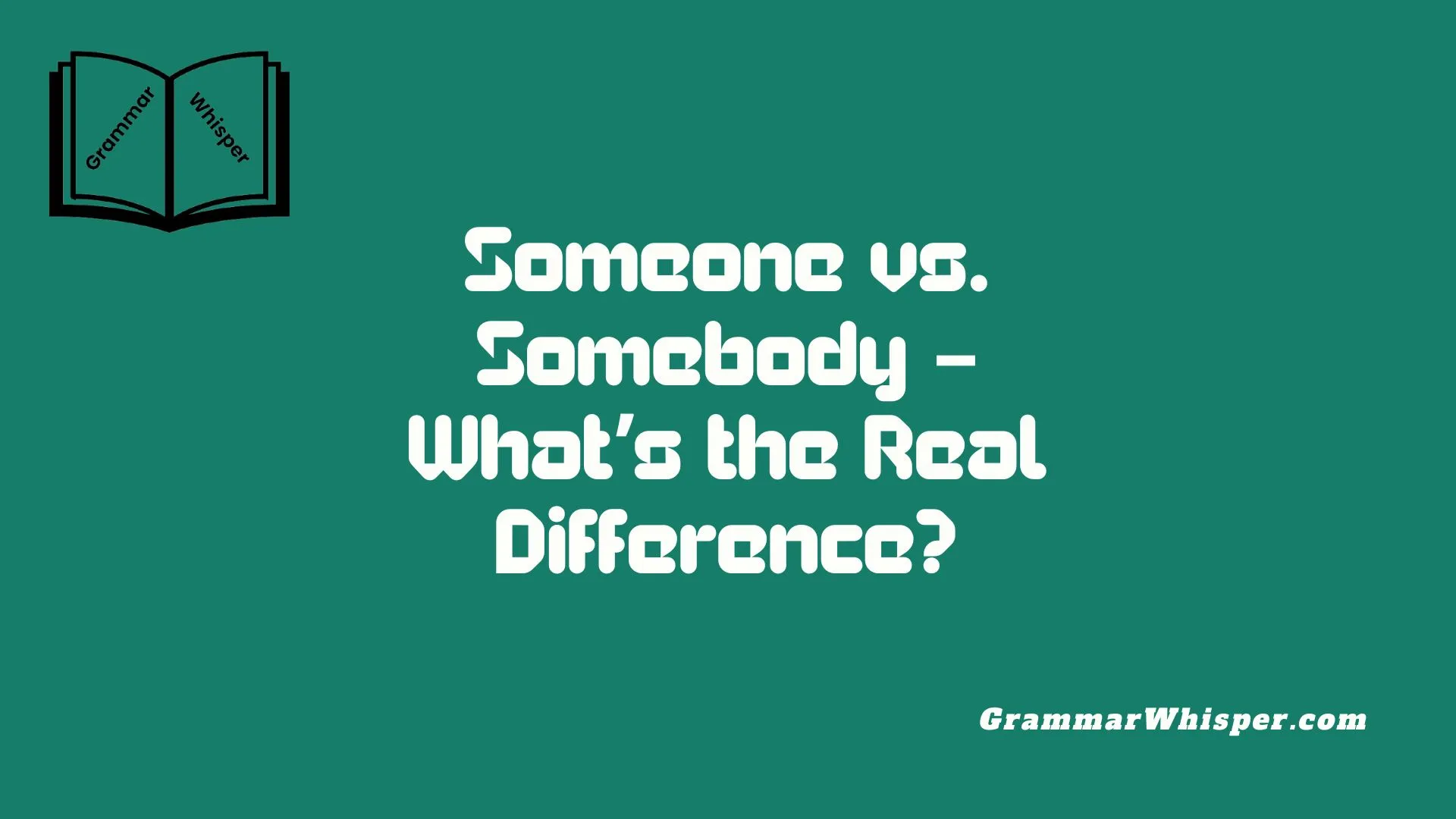In English, certain word pairs such as Someone vs. Somebody often generate silent confusion. They appear interchangeable, which is why many people don’t give them a second thought. But get a little closer, and you’ll realize they’re not linguistic twins, but more like siblings with distinct personalities. My experience with writing and composing emails, especially for business clients, has shown how important tone can be. While “someone” tends to come off as more formal, “somebody” carries a casual edge, more suited to friendly dialogue or relaxed speech. It’s these differences – however subtle – that help create the right emotional context.
This article explores how both native and non-native speakers face specific challenges when learning the language. Even though grammar rules treat them as equals, setting plays a crucial role in deciding the better choice. Writing a professional letter or report? Go with “someone.” Crafting a personal message? “Somebody” might feel warmer. An effective guide keeps track of these nuances, ensuring clarity and style. After all, mastering these subtle rules isn’t just about correctness – it’s about connecting with others using precision and empathy.
The Real Question: Is There a Difference Between Someone and Somebody?
At first glance, “someone” and “somebody” mean the same thing. Both refer to an unidentified person. They’re both indefinite pronouns used when the identity of the person is unknown or irrelevant.
But ask a linguist, editor, or language teacher, and they’ll tell you: context matters. The difference lies not in meaning, but in usage, tone, register, and formality.
Let’s break this down.
Core Definitions: What Do Someone and Somebody Actually Mean?
Both “someone” and “somebody” are used to refer to an unknown individual. But they come from slightly different origins.
| Word | Definition | Origin |
| Someone | An unspecified person; a person not identified by name. | Old English (sum + one) |
| Somebody | An unspecified or unknown individual. | Middle English (some + body) |
Key Points:
- They are grammatically singular.
- They function as subjects or objects in a sentence.
Example:
Someone left their umbrella. I need to speak to somebody about the invoice.
Are They the Same? Core Similarities Between Someone and Somebody
In most day-to-day situations, these words are completely interchangeable. No grammar rule prevents you from using one instead of the other.
Interchangeable Uses:
- Someone is calling.
- Somebody is calling.
Both are grammatically correct and convey the same idea.
However, style and tone can determine which one sounds better. That brings us to nuance.
The Subtle Divide: When Meaning and Tone Shift Slightly
This is where it gets interesting. While both words carry the same semantic meaning, they don’t always feel the same to the ear.
Tone and Rhythm
- Someone tends to sound more formal, clean, or polished.
- Somebody feels more informal, emotional, or conversational.
Example: “I need someone to manage the project.” (Business tone) “Somebody help me!” (Urgent, emotional tone)
In spoken English, somebody often feels warmer or more dramatic.
Contextual Nuances: How Culture and Region Affect Preference
Regional dialects play a role in someone vs. somebody preferences.
American English vs. British English
| Region | Preferred Use in Speech |
| American English | Slight favor for “somebody” |
| British English | Slight favor for “someone” |
Still, this is not a hard rule. Usage varies based on context, speaker, and audience.
Formal vs. Informal Settings
- In corporate or academic writing, “someone” is more common.
- In music lyrics, conversations, or TV dialogue, “somebody” appears frequently.
Someone vs. Somebody in Real Sentences: Context is Everything
Here are real-life sentences showcasing contextual preference:
| Sentence | More Natural Choice |
| Can someone help me reset this password? | Someone |
| Somebody stole my fries! | Somebody |
| I’m looking for someone who understands AI. | Someone |
| Somebody just rang the doorbell. | Somebody |
Why It Matters:
Choosing the right term can make your sentence more natural, fitting, and emotionally appropriate.
Colloquial Phrases & Expressions: Which One is Used Where?
Some idiomatic expressions are hardwired with either “someone” or “somebody.”
Expressions Using “Somebody”
- Somebody to love (Queen, Jefferson Airplane)
- Somebody’s watching me
- Be somebody
Expressions Using “Someone”
- Someone special
- Someone new
- Someone you loved (Lewis Capaldi)
These expressions often appear in pop culture, music, and romantic language, where emotional tone dominates.
Grammar Matters: Sentence Construction, Negatives & Questions
“Someone” and “somebody” follow the same grammatical rules. Let’s look at a few constructions.
In Negative Sentences
In negative constructions, it’s common to shift to anyone/anybody instead.
| Incorrect | Correct |
| I didn’t see someone. | I didn’t see anyone. |
| She hasn’t called somebody yet. | She hasn’t called anybody yet. |
In Questions
Both can be used interchangeably:
- Did someone call?
- Did somebody text me?
Tone and Formality: Understanding Register in English Usage
Register refers to the formality level of language. Tone affects perception, and that applies here too.
When to Use “Someone”:
- Business emails
- Formal documents
- Academic writing
When to Use “Somebody”:
- Dialogue in novels
- Marketing slogans
- Informal chats
Tip: If you’re unsure, “someone” is usually the safer default.
Psycholinguistic Differences: How These Words Affect Perception
Words shape thoughts. A 2012 study in cognitive linguistics noted that:
- The suffix -body feels more corporeal and emotional.
- The suffix -one feels more individualistic and abstract.
Impact on Reader or Listener:
- “Someone” may invoke an idea of a person.
- “Somebody” feels more like an actual body in the room.
This subtle difference can influence how your message is perceived.
Common Errors, Misconceptions, and Usage Myths
There’s a belief that one word is more correct than the other. That’s a myth.
Common Misconceptions:
- Only one is acceptable in professional settings. (False)
- “Someone” is always more proper. (False)
- You should never switch them. (False)
The truth: They’re grammatically equal. Use depends on rhythm, tone, and audience.
Someone vs. Somebody in Media, Music, and Pop Culture
Let’s explore examples from pop culture.
Songs Featuring “Somebody”
- “Somebody That I Used to Know” – Gotye
- “Somebody to Love” – Queen
- “Somebody’s Watching Me” – Rockwell
Songs Featuring “Someone”
- “Someone Like You” – Adele
- “Someone You Loved” – Lewis Capaldi
- “Someone Saved My Life Tonight” – Elton John
In most of these, emotional weight influences the choice of word.
Expert Recommendations: Which One Should You Use – and When?
Experts advise writers to consider tone and audience over fixed rules.
Professional Editors Say:
- “Someone” works better in polished content.
- “Somebody” adds character in narrative writing.
Quick Comparison Table
| Context | Better Choice | Reason |
| Email to HR | Someone | Formal tone |
| Fictional dialogue | Somebody | Informal, realistic |
| Job listing | Someone | Clear, direct |
| Blog post opening | Either | Depends on voice |
| Advertisement headline | Somebody | Catchy, emotional appeal |
Conclusion
Though “someone” and “somebody” mean the same, they don’t always feel the same. The difference lies in tone, rhythm, emotional intent, and context. Understanding how to use both with intention can elevate your writing and communication.
Remember:
- Use “someone” when tone needs to be professional, direct, or neutral.
- Use “somebody” when tone should be friendly, emotional, or dramatic.
There’s no right or wrong – only what’s right for your context.
FAQs
Is “someone” more formal than “somebody”?
Yes, in most professional or formal writing, “someone” is preferred.
Can I always use “someone” in place of “somebody”?
Technically, yes. But doing so may shift the tone of your writing.
Is one more common in American English?
“Somebody” may appear slightly more often in speech; “someone” in writing.
Which one should I use in a cover letter?
Use “someone” to maintain a professional tone.
Are there other pairs like this?
Yes. “Anybody vs. Anyone”, “Nobody vs. No one”, “Everybody vs. Everyone”.
Bonus Resource: Someone vs. Somebody at a Glance
| Criteria | Someone | Somebody |
| Formality | Higher | Lower |
| Common in Speech | Less | More |
| Common in Writing | More | Less |
| Emotional Warmth | Neutral | Higher |
| Use in Music | Less frequent | More frequent |
| Register | Formal | Informal |











